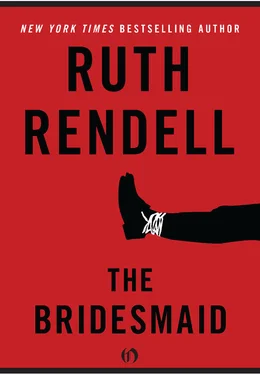Ruth Rendell - The Bridesmaid
Здесь есть возможность читать онлайн «Ruth Rendell - The Bridesmaid» весь текст электронной книги совершенно бесплатно (целиком полную версию без сокращений). В некоторых случаях можно слушать аудио, скачать через торрент в формате fb2 и присутствует краткое содержание. Год выпуска: 2010, Издательство: Open Road Integrated Media LLC, Жанр: Триллер, на английском языке. Описание произведения, (предисловие) а так же отзывы посетителей доступны на портале библиотеки ЛибКат.
- Название:The Bridesmaid
- Автор:
- Издательство:Open Road Integrated Media LLC
- Жанр:
- Год:2010
- ISBN:нет данных
- Рейтинг книги:3 / 5. Голосов: 1
-
Избранное:Добавить в избранное
- Отзывы:
-
Ваша оценка:
- 60
- 1
- 2
- 3
- 4
- 5
The Bridesmaid: краткое содержание, описание и аннотация
Предлагаем к чтению аннотацию, описание, краткое содержание или предисловие (зависит от того, что написал сам автор книги «The Bridesmaid»). Если вы не нашли необходимую информацию о книге — напишите в комментариях, мы постараемся отыскать её.
The Bridesmaid — читать онлайн бесплатно полную книгу (весь текст) целиком
Ниже представлен текст книги, разбитый по страницам. Система сохранения места последней прочитанной страницы, позволяет с удобством читать онлайн бесплатно книгу «The Bridesmaid», без необходимости каждый раз заново искать на чём Вы остановились. Поставьте закладку, и сможете в любой момент перейти на страницу, на которой закончили чтение.
Интервал:
Закладка:
He hated having to refuse that. Christine wouldn’t come into his room that night, but she would in the morning, she always did, bearing with her the cup of tea slopped into its saucer, the encrusted sugar bowl with the damp spoon stuck in it. She wouldn’t criticise him; she might even not mention she had found him with a girl in his bed; she might only look dismayed and terribly embarrassed, her eyes wide and her hand going up to her pursed lips—but he wouldn’t be able to bear it. It would be too much for him.
“I’d love you to, more than anything, but I don’t really think it’s on.” Without yet knowing her very well, he anticipated an immediate scene, fury perhaps or tears.
She surprised him by her radiant smile, the way she took his face in her hands and planted a tiny light kiss on his mouth. In a moment she was out of bed, shaking her hair, drawing her fingers through it. “It doesn’t matter. We can go to my place.”
“You’ve a place of your own?”
“Of course. It’s yours as well now, Philip. You understand that, don’t you? It’s yours as well.”
In Cheryl’s room, absent for an instant, she changed into the clothes she must have arrived in that morning: a long, full black skirt, a long, loose sweater of silvery knitted stuff the colour of her hair. These garments hid the shape of her as nearly as the burka hides the contours of the Islamic woman. Her slender legs, tiny ankles, were in black tights, her feet in flat black pumps. She came back into his room and saw Flora in the corner for the first time.
“She looks like me!”
He remembered what he had thought in Arnham’s garden before he stole her: if he ever met a girl like her, he would fall at once in love. His eyes went from Senta to the statue and he saw the resemblance. So often when you thought someone looked like someone else or like a picture, say, the likeness disappeared when they were together. This didn’t happen. They were twins, in stone and flesh. It made him shiver a little as if something solemn had happened. “Yes, she looks like you.” He realised he had spoken quite gravely. “I’ll tell you about her sometime,” he said.
“Yes, you must. I want to know all about you, Philip. I want to know everything. We must have no secrets from each other. Get dressed and come with me now. I’m scared of seeing other people— Oh, your mother, your sister, I don’t know. I just don’t want to meet anyone else. I think our first evening should be sacred somehow, don’t you?”
The rain lifted for them just before they left, and when they came out into the streaming street, the setting sun showed. The sun made all the puddles and sheets of water shine like a paving of gold. She had hesitated a little before leaving the house, as if to go out was to take some kind of plunge. Perhaps it was, for the street was like a shallow riverbed. Once inside the car, she drew in her breath and sighed as if with relief or perhaps just with happiness. He sat beside her and they kissed.
CHAPTER FIVE
This was a part of London he hardly knew, lying in westernmost West Kilburn and north of the Harrow Road. It was growing dark and after the rain the streets were empty of people. Opposite a huge sprawling school building, dating from the beginning of the century and surrounded by a high brick wall, was a food supply centre for down-and-outs, a soup kitchen. On its steps a queue of men waited, and one old woman with a basket on wheels in which a dog sat. Philip drove past a church set in a churchyard dark and dense as a wood and turned into Tarsus Street.
Only the plane trees, breaking into soon-to-be-abundant leaf, concealing and overshadowing fissures in the pavement and broken fences, saved it from being a slum. Their tender unfolding leaves were gilded in the light from street lamps and shed vine-like sharp-edged shadows. The house where Senta lived was in a terrace of plum-coloured brick. All the windows were flat and rectangular and recessed in the facade. A flight of ten steps led to the front door, a heavy, panelled wooden door. Once, many years past, it had been painted dark green, but now it was so pitted with chips and actual holes that it seemed as if someone had used it for target practice. From these steps it was possible to look over the plastered wall which served them as a balustrade and into the arena—clogged with rubbish, tin cans, paper, orange peel—that fronted the basement window. Senta unlocked the front door. The house was large, with three floors above the basement, but as soon as he was inside Philip sensed, without knowing how, that they were alone in it. This didn’t mean, of course, that Senta had sole possession of the house. The two bicycles leaning up against the wall, the pile of junk mail lying on a dilapidated mahogany table, made this improbable. All the doors were closed. She led him along the hall and down the basement stairs. The smell of the place was new to Philip. He couldn’t have defined it except to say it smelt very subtly of an accumulation of various kinds of ancient dirt—dirt that was never removed, never even shifted from one surface to another, one level to another—of food crumbs years old, fibres of unwashed clothes, dead insects, cobwebs, grains of mud and shreds of excrement, spilt liquids long dried, the hair of animals and their droppings, of dust and soot. It smelt of disintegration.
The basement had once been a self-contained flat. Or so it seemed. Its rooms, all but one, were used to store things, the objects that were perhaps partly responsible for the smell. Old furniture and crates of bottles and jars and heaps of old newspapers and piles of folded darkish woollen things that had once been blankets but which moths were reducing to a crumbling grey flocculent mass. An ancient lavatory with an overhead cistern which could be made private by drawing a sketchily rigged-up shower curtain. There was a claw-footed bath and a single cold tap of brass coated with a green crust and bandaged in rags.
Senta’s was the only inhabitable room. It was at the front of the house, the room whose window could be seen beyond the area. It contained primarily a large bed. This bed was six feet wide, with a sagging mattress, and made up with purple sheets and pillowcases that smelt as if they hadn’t been changed for rather a long time. There was also an enormous mirror, its frame adorned with plaster cherubs and fruit and flowers; much of the frame’s gilding as well as the occasional limb, twig, or petal had been chipped or had disappeared altogether.
On a low table stood a burnt-out candle in a saucer full of wax with an empty wine bottle beside it. There was a wicker chair draped with discarded clothes and a dying plant growing out of a brass pot full of dust. No curtains hung at the window but it could be covered by a pair of wooden shutters. A greyish watery light was shed into the room between these shutters, but it was insufficient to see by. Senta had lit the lamp, which had a bulb of low wattage under a parchment shade. That first evening, having looked wonderingly at the room, shocked by it and therefore feeling unsure of himself, he had asked her what she did.
“I’m an actor.”
“You mean an actress.”
“No, I don’t, Philip. You wouldn’t talk about a doctoress or a lawyeress, would your”
He conceded that. “Have you been on television?” he asked. “Would I have seen you in anything?”
She laughed but in a kindly way, an indulgent way. “I was at RADA. Now I’m waiting for the kind of part someone of my sort needs to make the best beginning. It would be letting myself down to take just anything, don’t you think?”
“I don’t know,” he said. “I don’t know anything about it.”
“But you will. You’ll learn from me. I want you to have opinions about me, Philip, that’s going to be the most important thing in my world, our world, what we think about each other. A spiritual interchange is going to be the essence of our life together.”
Читать дальшеИнтервал:
Закладка:
Похожие книги на «The Bridesmaid»
Представляем Вашему вниманию похожие книги на «The Bridesmaid» списком для выбора. Мы отобрали схожую по названию и смыслу литературу в надежде предоставить читателям больше вариантов отыскать новые, интересные, ещё непрочитанные произведения.
Обсуждение, отзывы о книге «The Bridesmaid» и просто собственные мнения читателей. Оставьте ваши комментарии, напишите, что Вы думаете о произведении, его смысле или главных героях. Укажите что конкретно понравилось, а что нет, и почему Вы так считаете.











